University Pharmacy Essay: Professional Communication and Patient Care
VerifiedAdded on 2023/04/17
|8
|1413
|179
Essay
AI Summary
This essay delves into the critical role of professional communication and professionalism in pharmacy, emphasizing their contribution to optimal patient care. The assignment begins by defining key concepts such as professionalism, patient-centered communication, accountability, altruism, and excellence, supported by academic literature. The essay then explores the importance of patient-centered communication, highlighting its impact on fostering effective healthcare delivery, including how it helps pharmacists build relationships with their patients, gather required information, and cultivate shared decision-making. The essay also discusses accountability in healthcare, emphasizing its role in enhancing service delivery through self-regulation. The essay concludes by reiterating the interconnectedness of these concepts and their ultimate goal of improving patient outcomes. The paper utilizes a minimum of eight academic references to support its arguments.
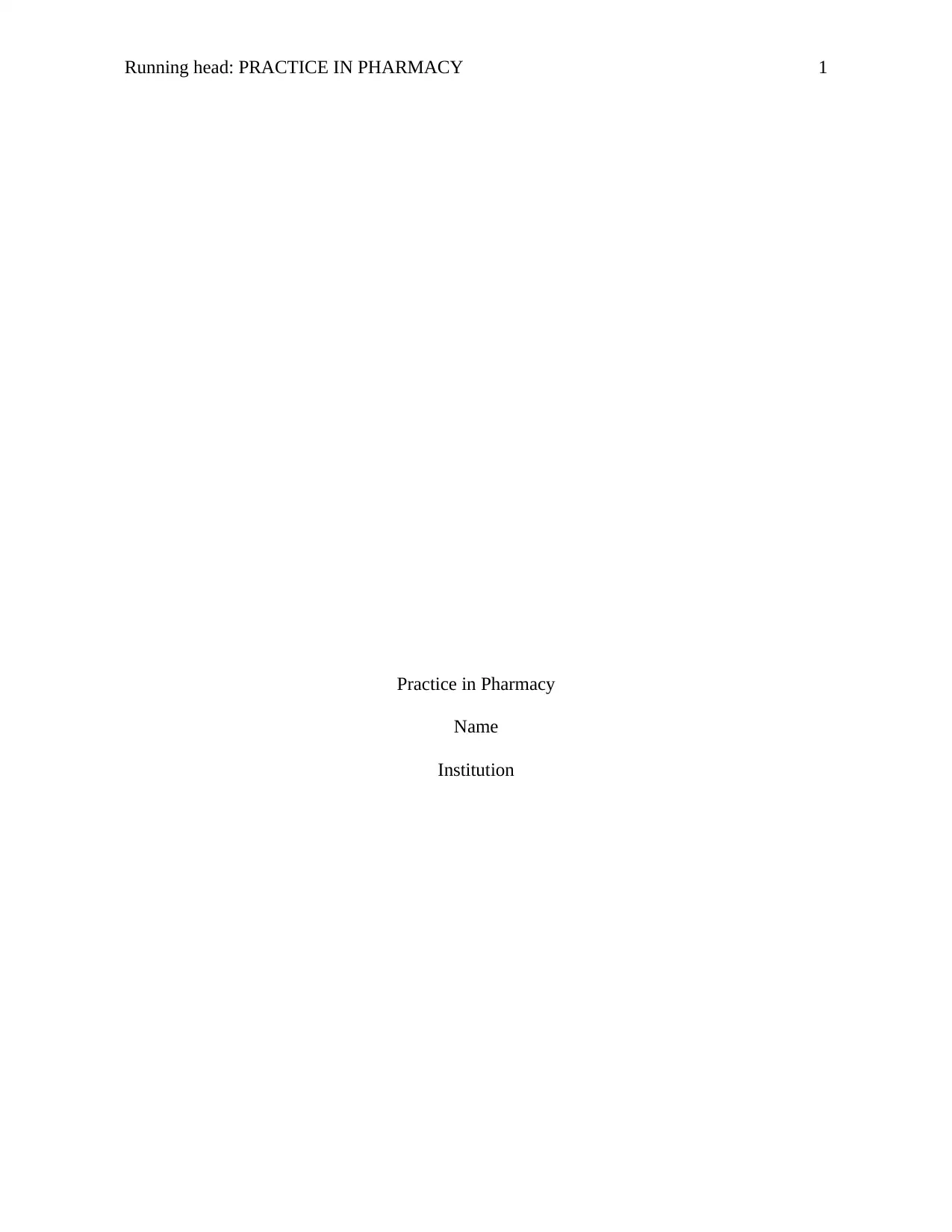
Running head: PRACTICE IN PHARMACY 1
Practice in Pharmacy
Name
Institution
Practice in Pharmacy
Name
Institution
Paraphrase This Document
Need a fresh take? Get an instant paraphrase of this document with our AI Paraphraser
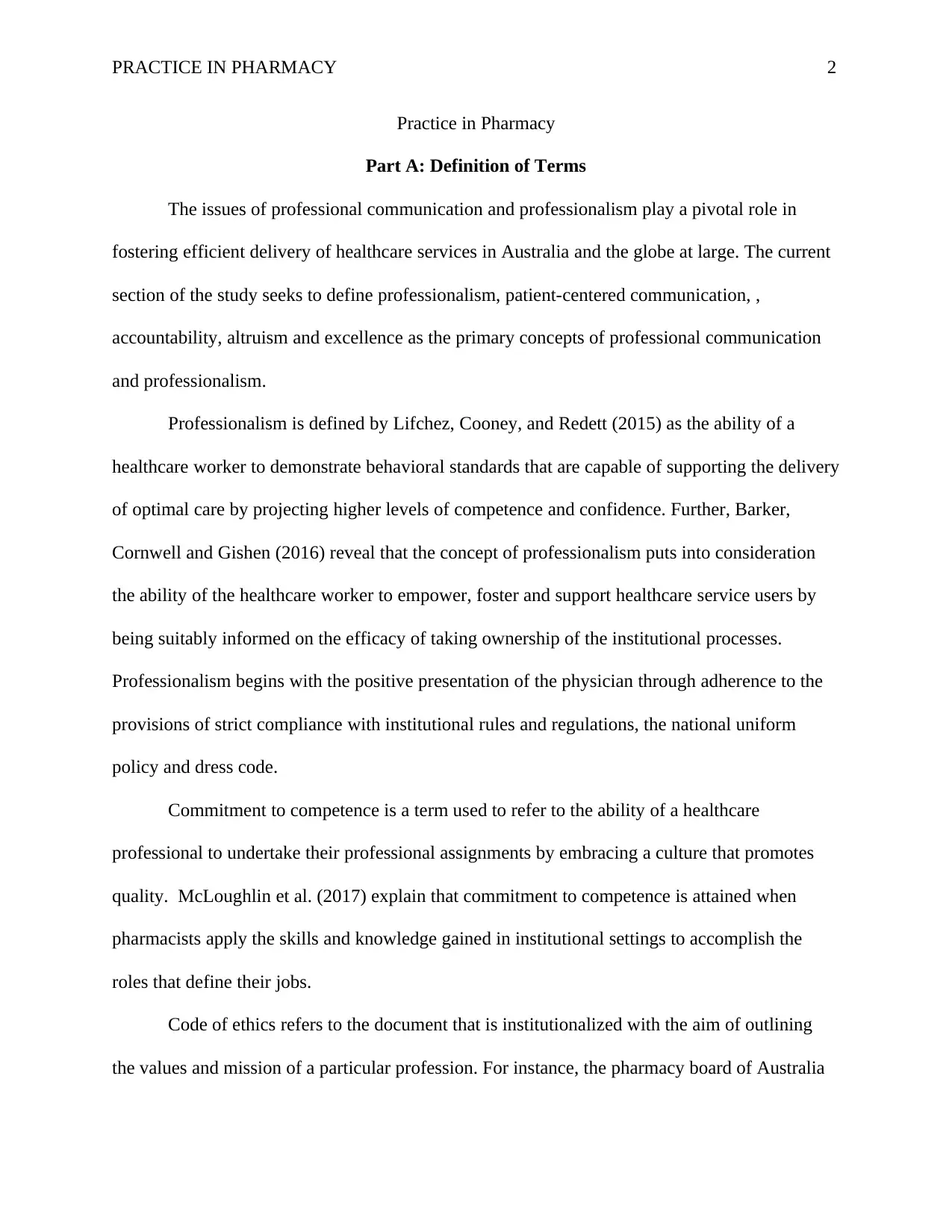
PRACTICE IN PHARMACY 2
Practice in Pharmacy
Part A: Definition of Terms
The issues of professional communication and professionalism play a pivotal role in
fostering efficient delivery of healthcare services in Australia and the globe at large. The current
section of the study seeks to define professionalism, patient-centered communication, ,
accountability, altruism and excellence as the primary concepts of professional communication
and professionalism.
Professionalism is defined by Lifchez, Cooney, and Redett (2015) as the ability of a
healthcare worker to demonstrate behavioral standards that are capable of supporting the delivery
of optimal care by projecting higher levels of competence and confidence. Further, Barker,
Cornwell and Gishen (2016) reveal that the concept of professionalism puts into consideration
the ability of the healthcare worker to empower, foster and support healthcare service users by
being suitably informed on the efficacy of taking ownership of the institutional processes.
Professionalism begins with the positive presentation of the physician through adherence to the
provisions of strict compliance with institutional rules and regulations, the national uniform
policy and dress code.
Commitment to competence is a term used to refer to the ability of a healthcare
professional to undertake their professional assignments by embracing a culture that promotes
quality. McLoughlin et al. (2017) explain that commitment to competence is attained when
pharmacists apply the skills and knowledge gained in institutional settings to accomplish the
roles that define their jobs.
Code of ethics refers to the document that is institutionalized with the aim of outlining
the values and mission of a particular profession. For instance, the pharmacy board of Australia
Practice in Pharmacy
Part A: Definition of Terms
The issues of professional communication and professionalism play a pivotal role in
fostering efficient delivery of healthcare services in Australia and the globe at large. The current
section of the study seeks to define professionalism, patient-centered communication, ,
accountability, altruism and excellence as the primary concepts of professional communication
and professionalism.
Professionalism is defined by Lifchez, Cooney, and Redett (2015) as the ability of a
healthcare worker to demonstrate behavioral standards that are capable of supporting the delivery
of optimal care by projecting higher levels of competence and confidence. Further, Barker,
Cornwell and Gishen (2016) reveal that the concept of professionalism puts into consideration
the ability of the healthcare worker to empower, foster and support healthcare service users by
being suitably informed on the efficacy of taking ownership of the institutional processes.
Professionalism begins with the positive presentation of the physician through adherence to the
provisions of strict compliance with institutional rules and regulations, the national uniform
policy and dress code.
Commitment to competence is a term used to refer to the ability of a healthcare
professional to undertake their professional assignments by embracing a culture that promotes
quality. McLoughlin et al. (2017) explain that commitment to competence is attained when
pharmacists apply the skills and knowledge gained in institutional settings to accomplish the
roles that define their jobs.
Code of ethics refers to the document that is institutionalized with the aim of outlining
the values and mission of a particular profession. For instance, the pharmacy board of Australia
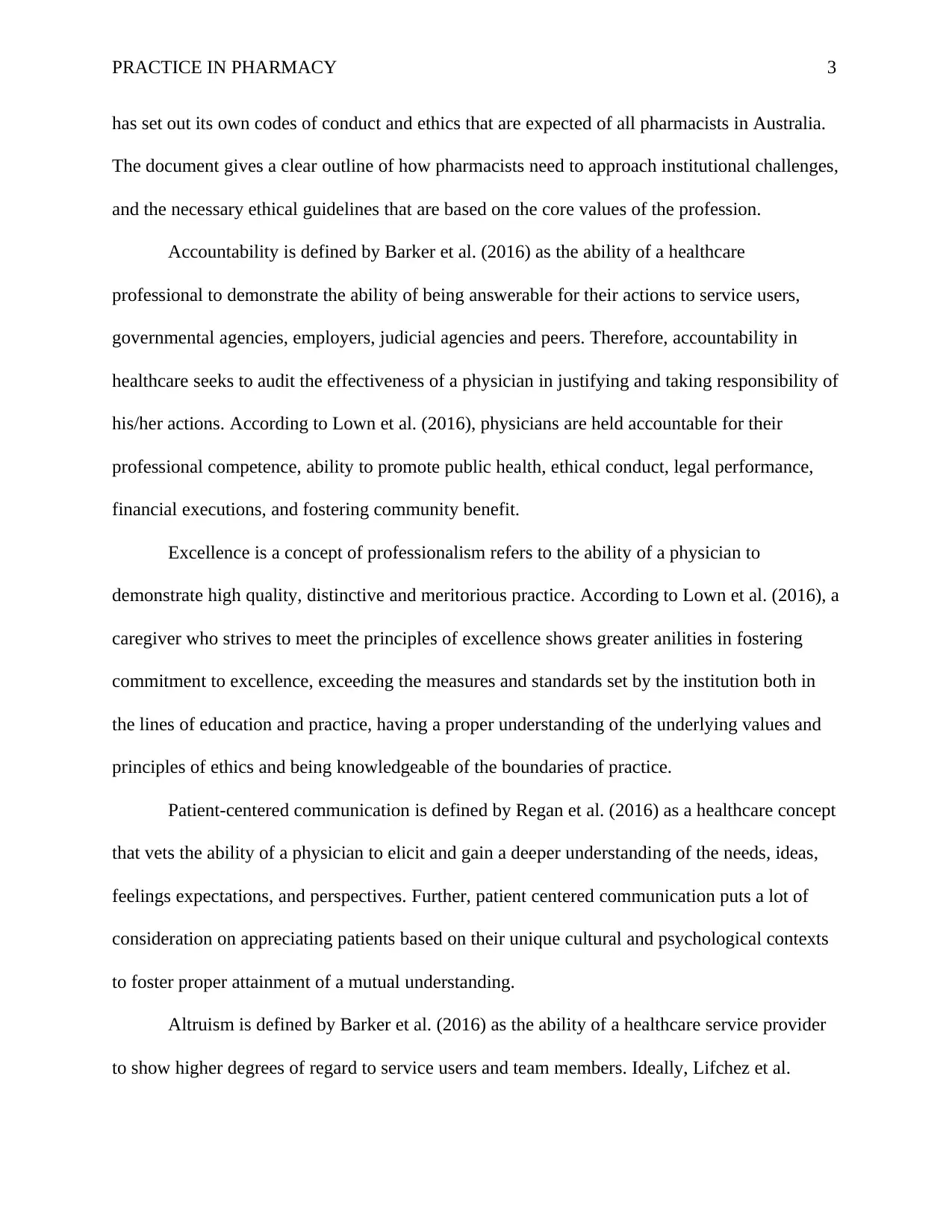
PRACTICE IN PHARMACY 3
has set out its own codes of conduct and ethics that are expected of all pharmacists in Australia.
The document gives a clear outline of how pharmacists need to approach institutional challenges,
and the necessary ethical guidelines that are based on the core values of the profession.
Accountability is defined by Barker et al. (2016) as the ability of a healthcare
professional to demonstrate the ability of being answerable for their actions to service users,
governmental agencies, employers, judicial agencies and peers. Therefore, accountability in
healthcare seeks to audit the effectiveness of a physician in justifying and taking responsibility of
his/her actions. According to Lown et al. (2016), physicians are held accountable for their
professional competence, ability to promote public health, ethical conduct, legal performance,
financial executions, and fostering community benefit.
Excellence is a concept of professionalism refers to the ability of a physician to
demonstrate high quality, distinctive and meritorious practice. According to Lown et al. (2016), a
caregiver who strives to meet the principles of excellence shows greater anilities in fostering
commitment to excellence, exceeding the measures and standards set by the institution both in
the lines of education and practice, having a proper understanding of the underlying values and
principles of ethics and being knowledgeable of the boundaries of practice.
Patient-centered communication is defined by Regan et al. (2016) as a healthcare concept
that vets the ability of a physician to elicit and gain a deeper understanding of the needs, ideas,
feelings expectations, and perspectives. Further, patient centered communication puts a lot of
consideration on appreciating patients based on their unique cultural and psychological contexts
to foster proper attainment of a mutual understanding.
Altruism is defined by Barker et al. (2016) as the ability of a healthcare service provider
to show higher degrees of regard to service users and team members. Ideally, Lifchez et al.
has set out its own codes of conduct and ethics that are expected of all pharmacists in Australia.
The document gives a clear outline of how pharmacists need to approach institutional challenges,
and the necessary ethical guidelines that are based on the core values of the profession.
Accountability is defined by Barker et al. (2016) as the ability of a healthcare
professional to demonstrate the ability of being answerable for their actions to service users,
governmental agencies, employers, judicial agencies and peers. Therefore, accountability in
healthcare seeks to audit the effectiveness of a physician in justifying and taking responsibility of
his/her actions. According to Lown et al. (2016), physicians are held accountable for their
professional competence, ability to promote public health, ethical conduct, legal performance,
financial executions, and fostering community benefit.
Excellence is a concept of professionalism refers to the ability of a physician to
demonstrate high quality, distinctive and meritorious practice. According to Lown et al. (2016), a
caregiver who strives to meet the principles of excellence shows greater anilities in fostering
commitment to excellence, exceeding the measures and standards set by the institution both in
the lines of education and practice, having a proper understanding of the underlying values and
principles of ethics and being knowledgeable of the boundaries of practice.
Patient-centered communication is defined by Regan et al. (2016) as a healthcare concept
that vets the ability of a physician to elicit and gain a deeper understanding of the needs, ideas,
feelings expectations, and perspectives. Further, patient centered communication puts a lot of
consideration on appreciating patients based on their unique cultural and psychological contexts
to foster proper attainment of a mutual understanding.
Altruism is defined by Barker et al. (2016) as the ability of a healthcare service provider
to show higher degrees of regard to service users and team members. Ideally, Lifchez et al.
⊘ This is a preview!⊘
Do you want full access?
Subscribe today to unlock all pages.

Trusted by 1+ million students worldwide
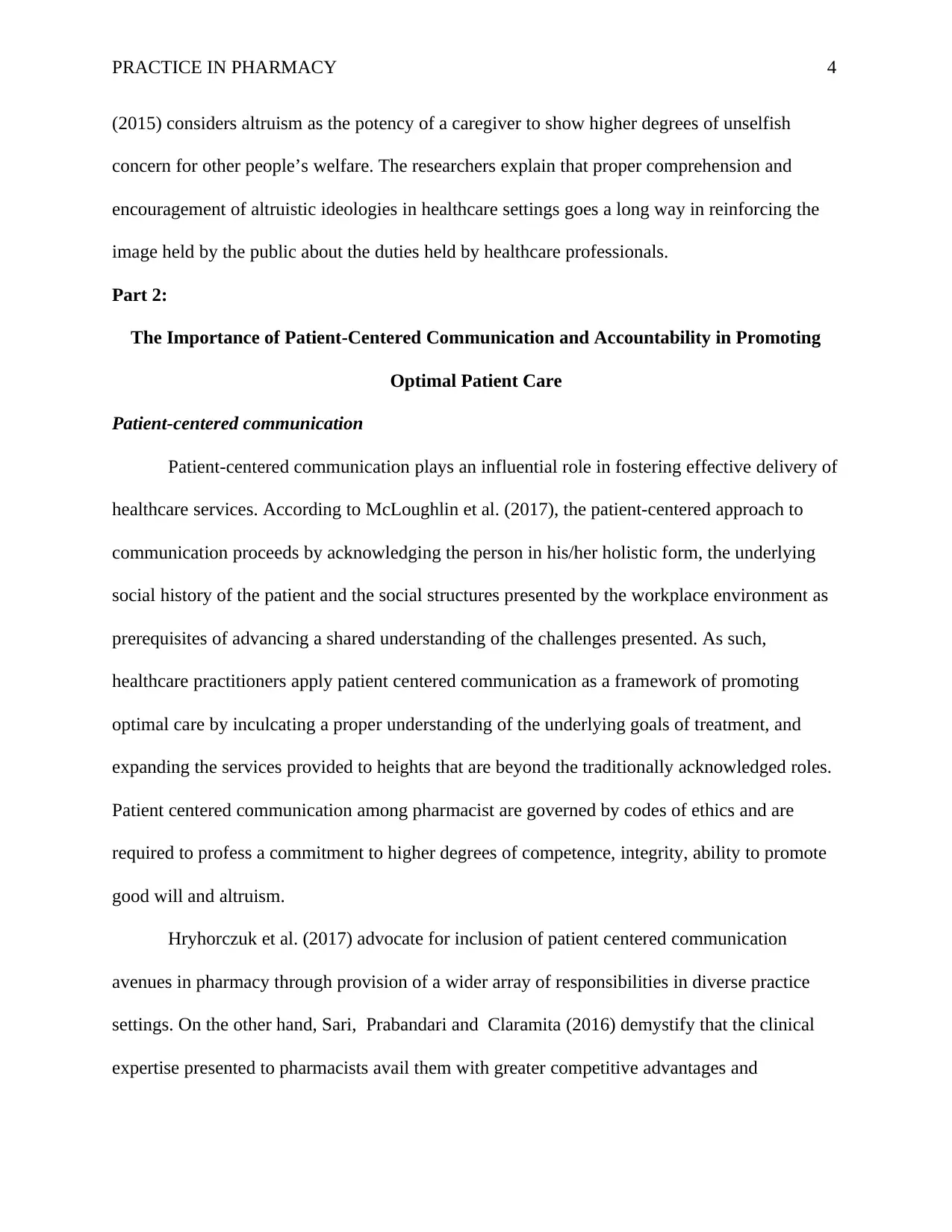
PRACTICE IN PHARMACY 4
(2015) considers altruism as the potency of a caregiver to show higher degrees of unselfish
concern for other people’s welfare. The researchers explain that proper comprehension and
encouragement of altruistic ideologies in healthcare settings goes a long way in reinforcing the
image held by the public about the duties held by healthcare professionals.
Part 2:
The Importance of Patient-Centered Communication and Accountability in Promoting
Optimal Patient Care
Patient-centered communication
Patient-centered communication plays an influential role in fostering effective delivery of
healthcare services. According to McLoughlin et al. (2017), the patient-centered approach to
communication proceeds by acknowledging the person in his/her holistic form, the underlying
social history of the patient and the social structures presented by the workplace environment as
prerequisites of advancing a shared understanding of the challenges presented. As such,
healthcare practitioners apply patient centered communication as a framework of promoting
optimal care by inculcating a proper understanding of the underlying goals of treatment, and
expanding the services provided to heights that are beyond the traditionally acknowledged roles.
Patient centered communication among pharmacist are governed by codes of ethics and are
required to profess a commitment to higher degrees of competence, integrity, ability to promote
good will and altruism.
Hryhorczuk et al. (2017) advocate for inclusion of patient centered communication
avenues in pharmacy through provision of a wider array of responsibilities in diverse practice
settings. On the other hand, Sari, Prabandari and Claramita (2016) demystify that the clinical
expertise presented to pharmacists avail them with greater competitive advantages and
(2015) considers altruism as the potency of a caregiver to show higher degrees of unselfish
concern for other people’s welfare. The researchers explain that proper comprehension and
encouragement of altruistic ideologies in healthcare settings goes a long way in reinforcing the
image held by the public about the duties held by healthcare professionals.
Part 2:
The Importance of Patient-Centered Communication and Accountability in Promoting
Optimal Patient Care
Patient-centered communication
Patient-centered communication plays an influential role in fostering effective delivery of
healthcare services. According to McLoughlin et al. (2017), the patient-centered approach to
communication proceeds by acknowledging the person in his/her holistic form, the underlying
social history of the patient and the social structures presented by the workplace environment as
prerequisites of advancing a shared understanding of the challenges presented. As such,
healthcare practitioners apply patient centered communication as a framework of promoting
optimal care by inculcating a proper understanding of the underlying goals of treatment, and
expanding the services provided to heights that are beyond the traditionally acknowledged roles.
Patient centered communication among pharmacist are governed by codes of ethics and are
required to profess a commitment to higher degrees of competence, integrity, ability to promote
good will and altruism.
Hryhorczuk et al. (2017) advocate for inclusion of patient centered communication
avenues in pharmacy through provision of a wider array of responsibilities in diverse practice
settings. On the other hand, Sari, Prabandari and Claramita (2016) demystify that the clinical
expertise presented to pharmacists avail them with greater competitive advantages and
Paraphrase This Document
Need a fresh take? Get an instant paraphrase of this document with our AI Paraphraser
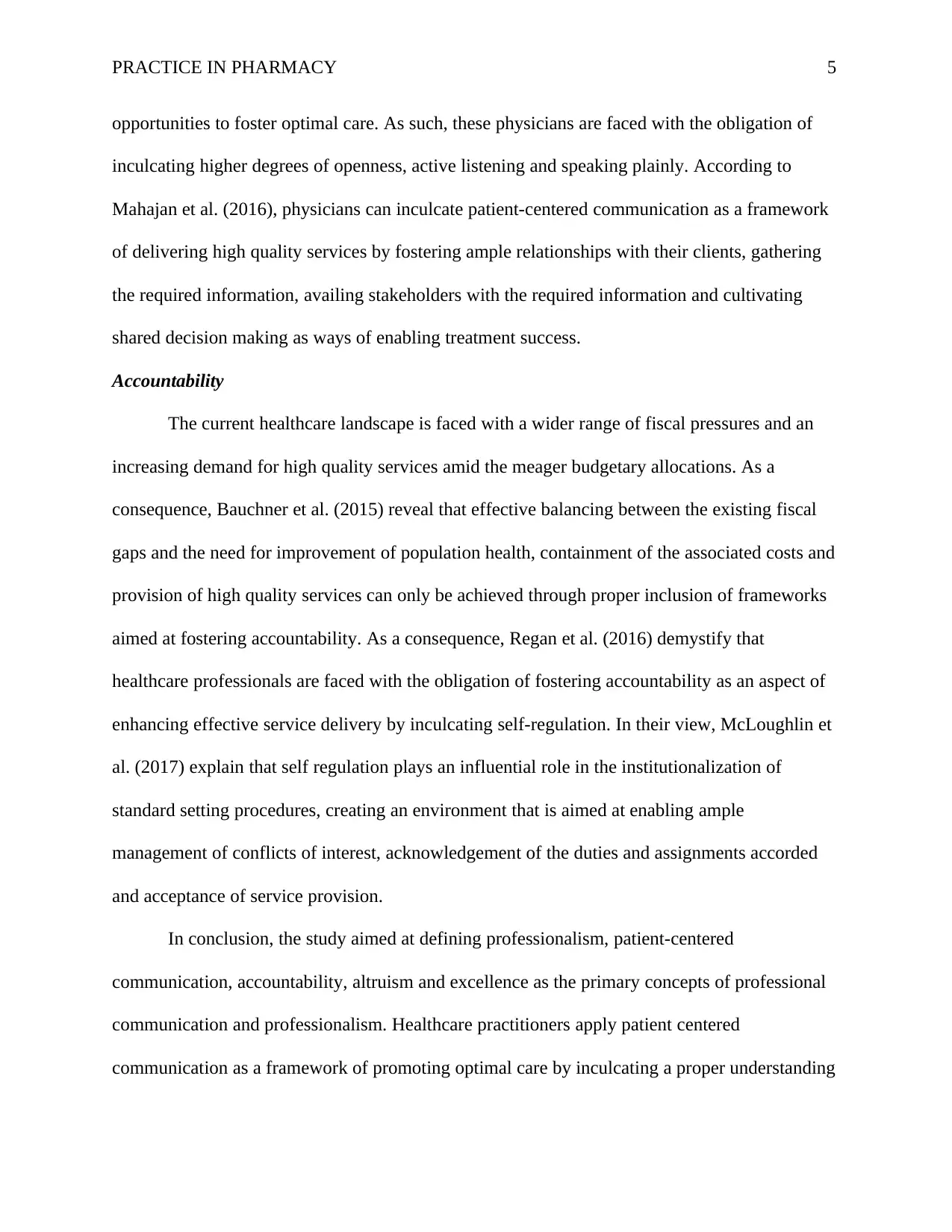
PRACTICE IN PHARMACY 5
opportunities to foster optimal care. As such, these physicians are faced with the obligation of
inculcating higher degrees of openness, active listening and speaking plainly. According to
Mahajan et al. (2016), physicians can inculcate patient-centered communication as a framework
of delivering high quality services by fostering ample relationships with their clients, gathering
the required information, availing stakeholders with the required information and cultivating
shared decision making as ways of enabling treatment success.
Accountability
The current healthcare landscape is faced with a wider range of fiscal pressures and an
increasing demand for high quality services amid the meager budgetary allocations. As a
consequence, Bauchner et al. (2015) reveal that effective balancing between the existing fiscal
gaps and the need for improvement of population health, containment of the associated costs and
provision of high quality services can only be achieved through proper inclusion of frameworks
aimed at fostering accountability. As a consequence, Regan et al. (2016) demystify that
healthcare professionals are faced with the obligation of fostering accountability as an aspect of
enhancing effective service delivery by inculcating self-regulation. In their view, McLoughlin et
al. (2017) explain that self regulation plays an influential role in the institutionalization of
standard setting procedures, creating an environment that is aimed at enabling ample
management of conflicts of interest, acknowledgement of the duties and assignments accorded
and acceptance of service provision.
In conclusion, the study aimed at defining professionalism, patient-centered
communication, accountability, altruism and excellence as the primary concepts of professional
communication and professionalism. Healthcare practitioners apply patient centered
communication as a framework of promoting optimal care by inculcating a proper understanding
opportunities to foster optimal care. As such, these physicians are faced with the obligation of
inculcating higher degrees of openness, active listening and speaking plainly. According to
Mahajan et al. (2016), physicians can inculcate patient-centered communication as a framework
of delivering high quality services by fostering ample relationships with their clients, gathering
the required information, availing stakeholders with the required information and cultivating
shared decision making as ways of enabling treatment success.
Accountability
The current healthcare landscape is faced with a wider range of fiscal pressures and an
increasing demand for high quality services amid the meager budgetary allocations. As a
consequence, Bauchner et al. (2015) reveal that effective balancing between the existing fiscal
gaps and the need for improvement of population health, containment of the associated costs and
provision of high quality services can only be achieved through proper inclusion of frameworks
aimed at fostering accountability. As a consequence, Regan et al. (2016) demystify that
healthcare professionals are faced with the obligation of fostering accountability as an aspect of
enhancing effective service delivery by inculcating self-regulation. In their view, McLoughlin et
al. (2017) explain that self regulation plays an influential role in the institutionalization of
standard setting procedures, creating an environment that is aimed at enabling ample
management of conflicts of interest, acknowledgement of the duties and assignments accorded
and acceptance of service provision.
In conclusion, the study aimed at defining professionalism, patient-centered
communication, accountability, altruism and excellence as the primary concepts of professional
communication and professionalism. Healthcare practitioners apply patient centered
communication as a framework of promoting optimal care by inculcating a proper understanding
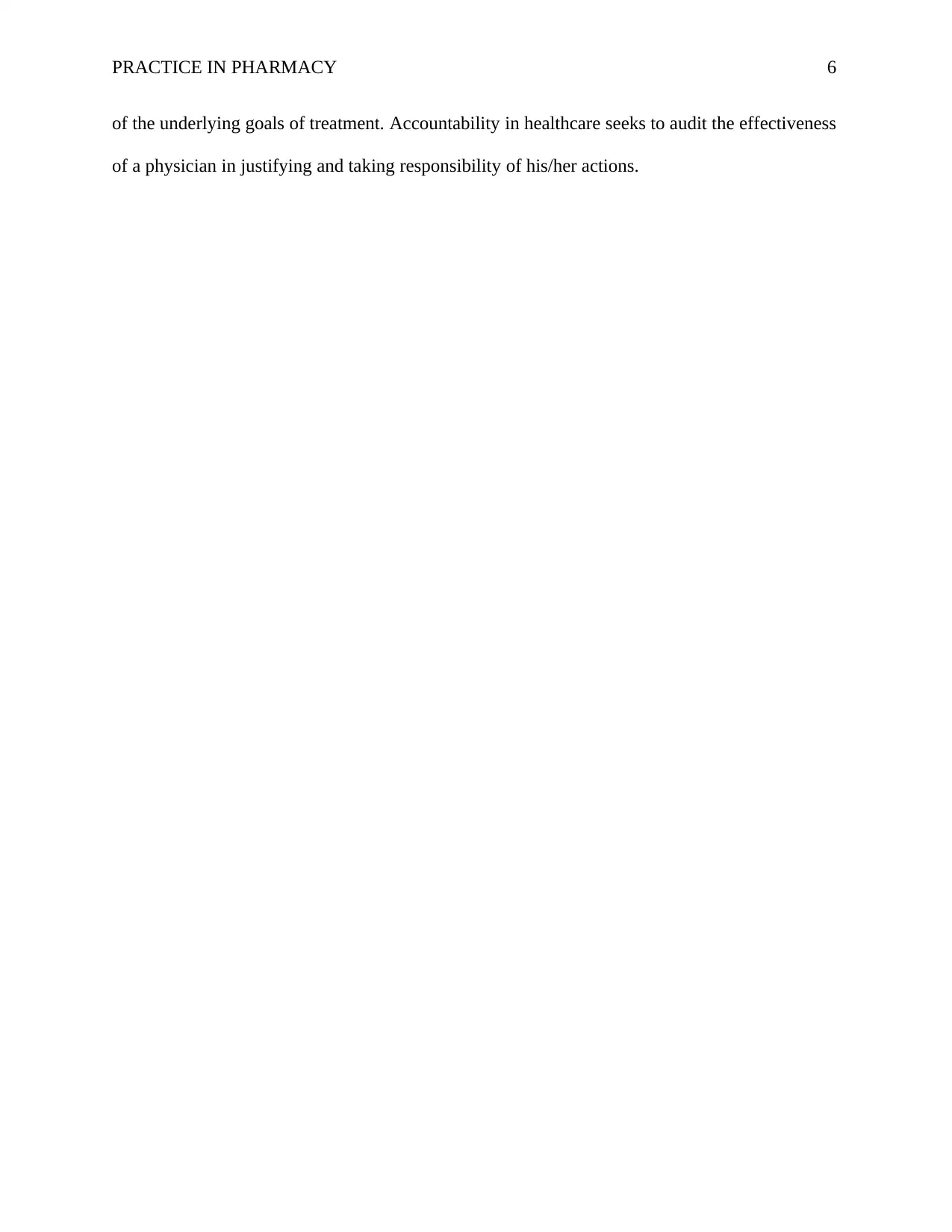
PRACTICE IN PHARMACY 6
of the underlying goals of treatment. Accountability in healthcare seeks to audit the effectiveness
of a physician in justifying and taking responsibility of his/her actions.
of the underlying goals of treatment. Accountability in healthcare seeks to audit the effectiveness
of a physician in justifying and taking responsibility of his/her actions.
⊘ This is a preview!⊘
Do you want full access?
Subscribe today to unlock all pages.

Trusted by 1+ million students worldwide
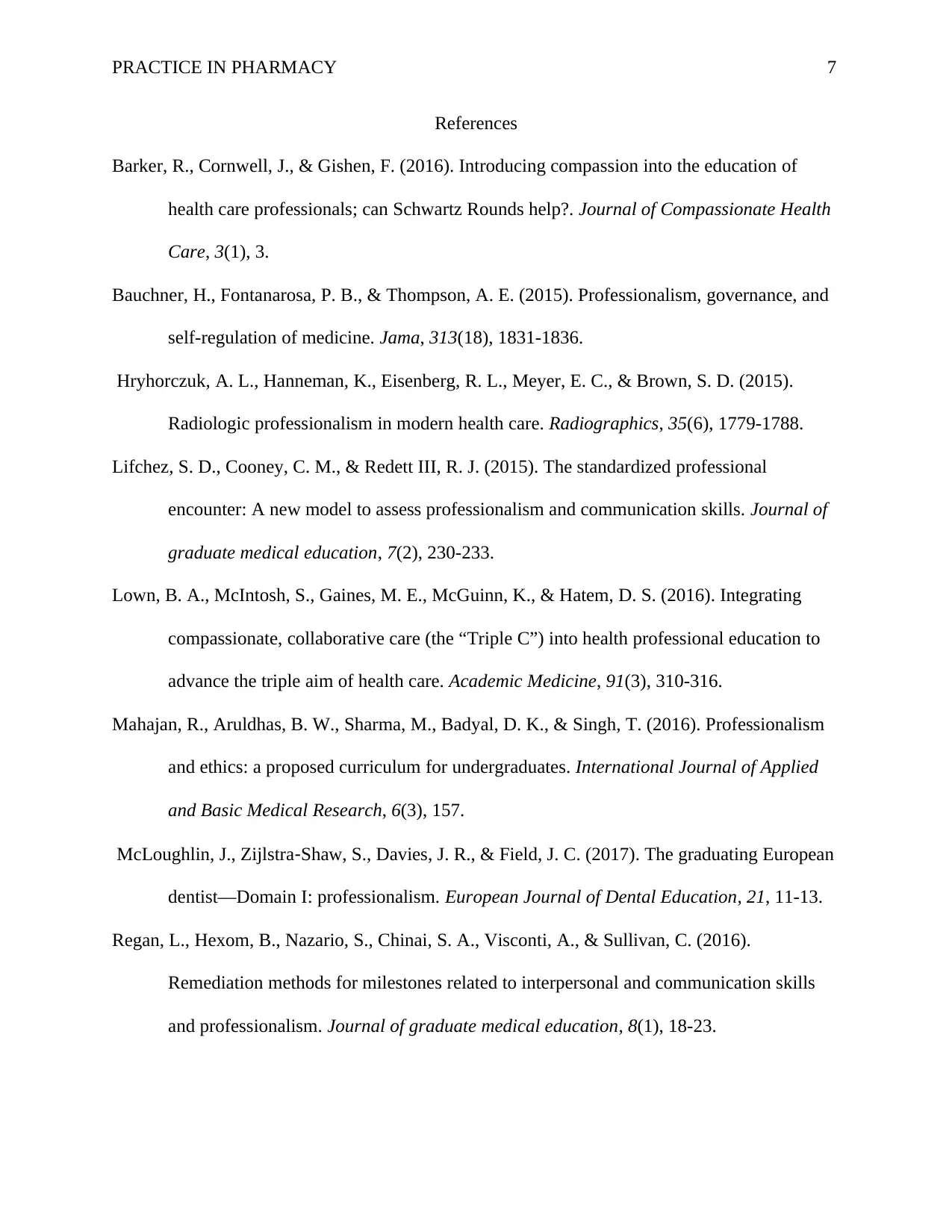
PRACTICE IN PHARMACY 7
References
Barker, R., Cornwell, J., & Gishen, F. (2016). Introducing compassion into the education of
health care professionals; can Schwartz Rounds help?. Journal of Compassionate Health
Care, 3(1), 3.
Bauchner, H., Fontanarosa, P. B., & Thompson, A. E. (2015). Professionalism, governance, and
self-regulation of medicine. Jama, 313(18), 1831-1836.
Hryhorczuk, A. L., Hanneman, K., Eisenberg, R. L., Meyer, E. C., & Brown, S. D. (2015).
Radiologic professionalism in modern health care. Radiographics, 35(6), 1779-1788.
Lifchez, S. D., Cooney, C. M., & Redett III, R. J. (2015). The standardized professional
encounter: A new model to assess professionalism and communication skills. Journal of
graduate medical education, 7(2), 230-233.
Lown, B. A., McIntosh, S., Gaines, M. E., McGuinn, K., & Hatem, D. S. (2016). Integrating
compassionate, collaborative care (the “Triple C”) into health professional education to
advance the triple aim of health care. Academic Medicine, 91(3), 310-316.
Mahajan, R., Aruldhas, B. W., Sharma, M., Badyal, D. K., & Singh, T. (2016). Professionalism
and ethics: a proposed curriculum for undergraduates. International Journal of Applied
and Basic Medical Research, 6(3), 157.
McLoughlin, J., Zijlstra‐Shaw, S., Davies, J. R., & Field, J. C. (2017). The graduating European
dentist—Domain I: professionalism. European Journal of Dental Education, 21, 11-13.
Regan, L., Hexom, B., Nazario, S., Chinai, S. A., Visconti, A., & Sullivan, C. (2016).
Remediation methods for milestones related to interpersonal and communication skills
and professionalism. Journal of graduate medical education, 8(1), 18-23.
References
Barker, R., Cornwell, J., & Gishen, F. (2016). Introducing compassion into the education of
health care professionals; can Schwartz Rounds help?. Journal of Compassionate Health
Care, 3(1), 3.
Bauchner, H., Fontanarosa, P. B., & Thompson, A. E. (2015). Professionalism, governance, and
self-regulation of medicine. Jama, 313(18), 1831-1836.
Hryhorczuk, A. L., Hanneman, K., Eisenberg, R. L., Meyer, E. C., & Brown, S. D. (2015).
Radiologic professionalism in modern health care. Radiographics, 35(6), 1779-1788.
Lifchez, S. D., Cooney, C. M., & Redett III, R. J. (2015). The standardized professional
encounter: A new model to assess professionalism and communication skills. Journal of
graduate medical education, 7(2), 230-233.
Lown, B. A., McIntosh, S., Gaines, M. E., McGuinn, K., & Hatem, D. S. (2016). Integrating
compassionate, collaborative care (the “Triple C”) into health professional education to
advance the triple aim of health care. Academic Medicine, 91(3), 310-316.
Mahajan, R., Aruldhas, B. W., Sharma, M., Badyal, D. K., & Singh, T. (2016). Professionalism
and ethics: a proposed curriculum for undergraduates. International Journal of Applied
and Basic Medical Research, 6(3), 157.
McLoughlin, J., Zijlstra‐Shaw, S., Davies, J. R., & Field, J. C. (2017). The graduating European
dentist—Domain I: professionalism. European Journal of Dental Education, 21, 11-13.
Regan, L., Hexom, B., Nazario, S., Chinai, S. A., Visconti, A., & Sullivan, C. (2016).
Remediation methods for milestones related to interpersonal and communication skills
and professionalism. Journal of graduate medical education, 8(1), 18-23.
Paraphrase This Document
Need a fresh take? Get an instant paraphrase of this document with our AI Paraphraser
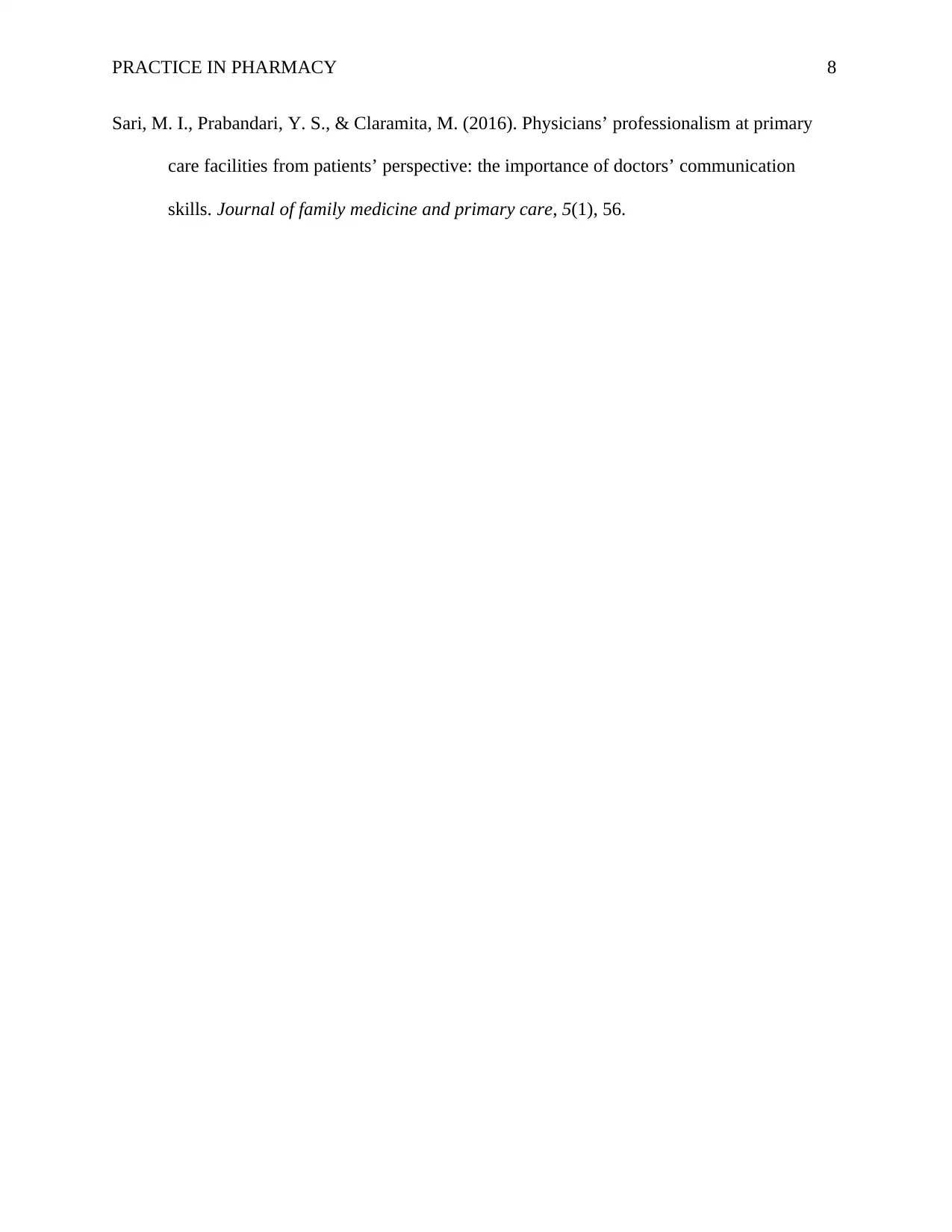
PRACTICE IN PHARMACY 8
Sari, M. I., Prabandari, Y. S., & Claramita, M. (2016). Physicians’ professionalism at primary
care facilities from patients’ perspective: the importance of doctors’ communication
skills. Journal of family medicine and primary care, 5(1), 56.
Sari, M. I., Prabandari, Y. S., & Claramita, M. (2016). Physicians’ professionalism at primary
care facilities from patients’ perspective: the importance of doctors’ communication
skills. Journal of family medicine and primary care, 5(1), 56.
1 out of 8
Related Documents
Your All-in-One AI-Powered Toolkit for Academic Success.
+13062052269
info@desklib.com
Available 24*7 on WhatsApp / Email
![[object Object]](/_next/static/media/star-bottom.7253800d.svg)
Unlock your academic potential
Copyright © 2020–2026 A2Z Services. All Rights Reserved. Developed and managed by ZUCOL.





